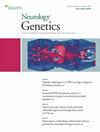Refractory Epilepsy in Adult Patient With COQ8A Variant Improves With CoQ10 Supplementation: A Case for Exome Sequencing in the ICU.
IF 3
3区 医学
Q2 CLINICAL NEUROLOGY
引用次数: 0
Abstract
Objectives Describe a case of stroke-like episodes and refractory status epilepticus diagnosed with primary CoQ10 deficiency-4 (COQ10D4) using whole-exome sequencing in the intensive care unit (ICU), with treatment implications. Methods A patient presented to the emergency department with 1 month of progressively worsening focal motor status epilepticus and stroke-like imaging abnormalities. Multiple seizure medications, ketogenic diet, and elective intubation for anesthetic drips failed to achieve sustained seizure freedom. Genetic testing was pursued for prognostic information and identified potential treatment. Results Whole-exome sequencing revealed compound heterozygous variants of COQ8A, including 1 allele not previously described as pathogenic. The patient's history, imaging, and genetic testing supported a diagnosis of COQ10D4. High-dose coenzyme Q10 supplementation was started with gradual clinical improvement. Discussion Whole-exome sequencing is a fast and cost-effective means to diagnose rare neurologic disease in critically ill patients and can uncover treatment options. While primarily used in the neonatal ICU, appropriately selected adult patients may also benefit.补充辅酶Q10可改善COQ8A变异成人患者的难治性癫痫:重症监护室中的外显子组测序案例。
目的描述一例在重症监护病房(ICU)使用全外显子组测序诊断为原发性辅酶Q10缺乏症-4(COQ10D4)的中风样发作和难治性癫痫状态病例,并说明其治疗意义。方法一名患者因局灶性运动状态癫痫和中风样影像学异常逐渐恶化1个月而就诊于急诊科。多种癫痫发作药物、生酮饮食和选择性插管滴注麻醉剂均未能使患者持续摆脱癫痫发作。结果全外显子组测序发现了 COQ8A 的复合杂合变异,其中有一个等位基因以前未被描述为致病。患者的病史、影像学检查和基因检测结果均支持COQ10D4的诊断。讨论全外显子组测序是诊断重症患者罕见神经系统疾病的一种快速、经济的方法,并能发现治疗方案。虽然全基因组测序主要用于新生儿重症监护病房,但经过适当选择的成年患者也可从中受益。
本文章由计算机程序翻译,如有差异,请以英文原文为准。
求助全文
约1分钟内获得全文
求助全文
来源期刊

Neurology-Genetics
Medicine-Neurology (clinical)
CiteScore
6.30
自引率
3.20%
发文量
107
审稿时长
15 weeks
期刊介绍:
Neurology: Genetics is an online open access journal publishing peer-reviewed reports in the field of neurogenetics. Original articles in all areas of neurogenetics will be published including rare and common genetic variation, genotype-phenotype correlations, outlier phenotypes as a result of mutations in known disease-genes, and genetic variations with a putative link to diseases. This will include studies reporting on genetic disease risk and pharmacogenomics. In addition, Neurology: Genetics will publish results of gene-based clinical trials (viral, ASO, etc.). Genetically engineered model systems are not a primary focus of Neurology: Genetics, but studies using model systems for treatment trials are welcome, including well-powered studies reporting negative results.
 求助内容:
求助内容: 应助结果提醒方式:
应助结果提醒方式:


